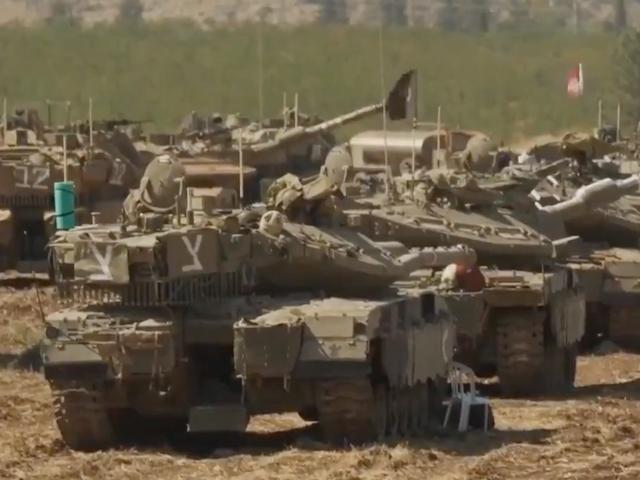Rumors are swirling across various media platforms, including an all-day X Space dedicated to the rumor that was hosted by renowned social media figure, Mario Nawfal, whose digital roundtable discussions regularly draw millions of listeners. Speculation has reached a fever pitch, with some anticipating an imminent Israeli invasion of Lebanon as the IDF continues its conflict with Hezbollah. However, security analysts close to Israel's defense plans suggest that no final decision has yet been made regarding an invasion.
A Calculated Response on the Table
If the IDF does opt for an invasion, the current strategy would likely involve a targeted, limited incursion into southern Lebanon. This would not be a full-scale occupation, but a focused operation aimed at neutralizing Hezbollah’s threat closer to the Israeli border. Sources indicate that this plan could be modified based on the evolving situation, with a more aggressive campaign being considered if Hezbollah strikes a significant blow to Israel’s home front.
🚨🇱🇧🇮🇱 BREAKING: POSSIBLE INVASION OF LEBANON SOON - MULTIPLE SOURCES
— Mario Nawfal (@MarioNawfal) September 28, 2024
Reports indicate Israeli tanks and ground troops are advancing toward the Lebanese border.
Sources close to the IDF suggest the operation could start tonight, aiming to secure territory up to the Litani… https://t.co/0k2IicrCQg pic.twitter.com/berj0ePDv6
Hezbollah has so far refrained from delivering a fatal hit that would force Israel's hand, but that scenario remains fluid. A more devastating attack could fast-track Israel's timetable for a ground invasion, potentially pushing them to advance deeper into Lebanese territory in a bid to cripple Hezbollah’s rocket capabilities more swiftly.
No Final Decision Yet—But Time Is Running Out
Despite the assassination of Hezbollah's longtime leader Hassan Nasrallah last Friday, Israel has not yet committed to a ground offensive. Military and government officials are weighing the necessity of such an operation, which could be crucial to forcing Hezbollah to retreat its forces northward, possibly to the Litani River or another defensive boundary. This would create a much-needed buffer for the 60,000 Israeli citizens who have been living as evacuees from Israel’s northern region for nearly a year due to the constant threat of Hezbollah attacks.
🚨🇮🇱🇱🇧ISRAEL CLAIMS RUMORS OF TROOPS IN LEBANON ARE FALSE
— Alex Kennedy (@therealmindman) September 29, 2024
According to officials, the IDF has not yet entered Lebanon as part of its ongoing conflict with Hezbollah.
They claim the IDF and government have not yet made a final decision about whether a ground invasion will be… pic.twitter.com/DQLTYZUBdO
Much depends on how Hezbollah’s next leader—who has yet to be announced—chooses to navigate the ongoing crisis. There is slim optimism that the new figure could adopt a more pragmatic stance, though skepticism abounds within Israel’s intelligence community. In the meantime, Israeli officials are treading cautiously, hoping that diplomatic channels might still offer a resolution, or at the very least, earn Israel more leniency from the U.S., which has voiced its displeasure over Nasrallah's assassination.
Preparing for the Worst, Hoping for the Best
Although no immediate invasion is expected, preparations for such a scenario are clearly underway. Military maneuvers and troop movements along Israel’s northern border are ongoing, though analysts caution that these could be routine preemptive measures rather than an indicator of an imminent invasion. Still, the window for action is closing rapidly.
🚨 All Israeli media are reporting limited movement of IDF ground forces against Hezbollah positions that represent an immediate threat across the Lebanese border. Not necessarily an invasion but could represent a prelude to larger and deeper ground action. pic.twitter.com/JI3UeUPWxe
— Joseph Gelman (@ifofgot) September 29, 2024
The timing of any potential invasion is under serious debate within the Israeli defense establishment. Some experts argue that if Israel is to act, it should do so within the next several weeks, ideally wrapping up ground operations before Lebanon's harsh winter conditions—notoriously brutal in the mountains—make maneuvering more difficult. Others are less concerned, suggesting that the rainy season, which begins in late October, will not become a significant obstacle until December. But December presents its own risks, and waiting too long could allow Hezbollah to regroup.
The Clock is Ticking
In conclusion, Israel faces a delicate balancing act. It must decide whether to invade before weather conditions complicate the situation while also giving diplomacy—however slim the chances—a bit more time to work. For now, the world watches and waits, but the reality is clear: if Hezbollah strikes harder or shows no willingness to back down, Israel’s patience may run out much sooner than expected. An invasion, if it comes, would be a calculated move, designed to safeguard Israeli lives, disrupt Hezbollah’s infrastructure, and send a clear message about Israel’s determination to secure its northern border once and for all.
What remains uncertain is not if Israel will act, but when.


